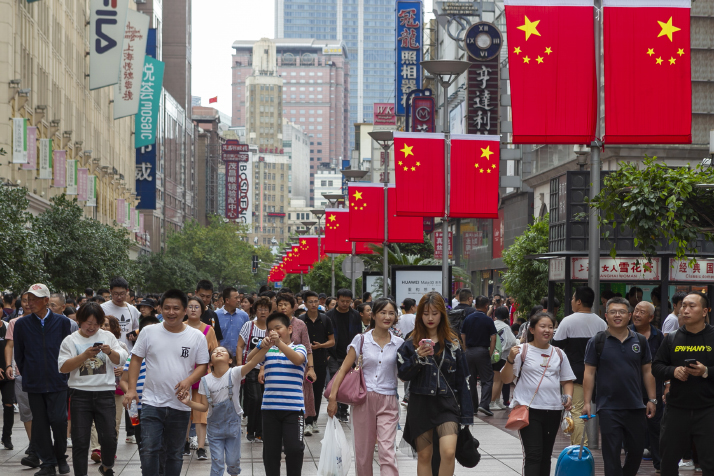| Opinion |
| A Grand Path | |
| Peter Walker shares his observations on China's journey over the past 70 years and the road ahead | |
|
|
 Visitors stroll through the Nanjing Road commercial street in Shanghai on October 2 (XINHUA)
The vast majority of China's development has been in the past 40 years during the reform and opening-up period. The credit to Chairman Mao Zedong holds that the overwhelming view of the Chinese people holds that he gave them back their country. The years under Mao were very important in terms of solidifying China's identity as a country and recognizing its history and unique culture. But obviously, when Mao passed away and Deng Xiaoping took over, although China was a sovereign country and proud of its accomplishments over many centuries, its economy was not strong. What Deng did that was incredibly powerful was to say that China had slipped as an economy because it had missed the industrial revolution and therefore, the whole area of manufacturing skills and technology lagged behind the West as well as Japan and the Republic of Korea. So basically starting from scratch, he proclaimed that China was going to open up, get as much exposure to Western expertise as quickly as possible and bring it to China and adapt it to the Chinese way. China went through an amazing 40-year period, going from a not very productive agricultural model to an agricultural sector which became far more productive by sharing benefits with the farmers and encouraging them to work harder to be able to keep more of the surplus. Then it went through a period of becoming the world's leading manufacturer for export, taking advantage of low labor costs and the expertise that frankly, it got largely from the rest of the world. That model has mostly played out mainly because China no longer has the cheapest labor; it can now be found in Southeast Asia. That's why President Xi Jinping has emphasized China is now ready to drive technology as the new engine of its economy. One statistic that's very important for everyone to keep in mind is that the proportion of people in Chinese schools with backgrounds in math, engineering, science, biotech or other technical areas, is four times greater than that of the U.S. And we've already seen from the performance of Chinese scientists and mathematicians in U.S. universities that they're as good as any in the world. So the whole next generational wave going toward technology is likely to be very successful. And while the U.S. is trying to contain China by not giving them access to its latest technologies, it's too late. The reality is, in artificial intelligence, renewable energy and many other top scientific areas, China is already equal to the U.S. As the largest exporting country for many years running, China has really facilitated free trade globally. And that's been an enormous benefit to everyone, because the underlying theory of free trade is that each country does what it does best. And therefore, every country is able to benefit from the manufacturing prowess and skills of the best country globally at doing it. So it's a win-win. Let's go back and review the engines of the Chinese economy. One is a rapidly growing consumer class of middle-income and upper middle-income people, which has largely been the result of urbanization. China has very systematically moved people from agricultural to urban areas, leading to a huge increase in productivity, since every time you take a farmer and put him or her in an urban setting, his or her productivity increases by a factor of six. This means China is far less dependent on export manufacturing to drive its GDP. The second engine is investment in technological innovation, which hasn't yet grabbed hold because it's going to take a while. The third driver is the Belt and Road Initiative. China clearly saw that over time, it was becoming overly dependent on the U.S. for its economy, while the U.S. was becoming increasingly irrational and difficult. Thus, the initiative is a great way to leverage China's industrial capacity, because no one in the world has been more effective and efficient in building infrastructure than China, and bring it to Africa, Southeast Asia, Eastern Europe and other parts of the world. Copyedited by Rebeca Toledo Comments to yanwei@bjreview.com |
|
||||||||||||||||||||||||||||||
|
